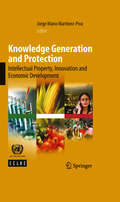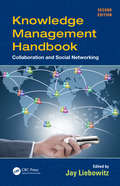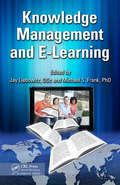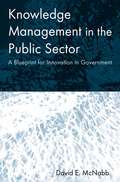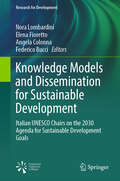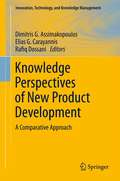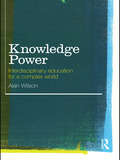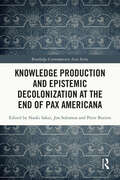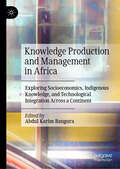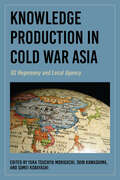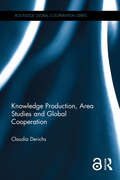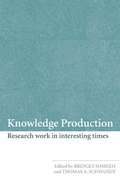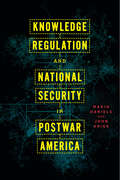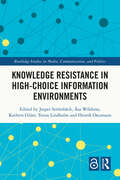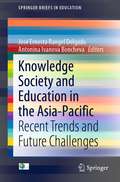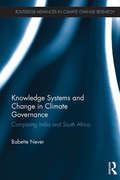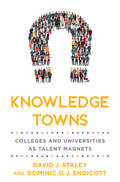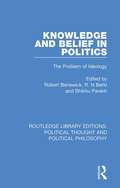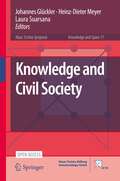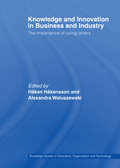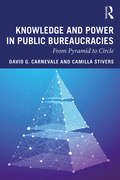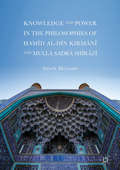- Table View
- List View
Knowledge Generation and Protection
by Jorge Mario Martínez-PivaThe wealth of the most developed nations, and, to a large extent their economic growth, can be explained by the capacities to generate research, create knowledge, appropriate it and transform it into new technologies. The study of the dynamics and contemporary mechanisms for the circulation, access, and commercial application of knowledge is an urgent task, since the capabilities related to technological change appear increasingly to be the path for developing countries to move away from their condition on the periphery. Knowledge Generation and Protection, showcasing research from academics, policymakers, and consultants, offers an analysis of three fundamental topics. The first is whether strengthening protection of intellectual property encourages or hinders technological learning and innovation in the developing countries. The second addresses the way in which knowledge is generated and how it is transformed into useful technology for the market, that is, how national innovation systems work. The third is the role of public policy as an instrument for innovation and for regulating intellectual property. Chapters explore the relationships among intellectual property, innovation, economic development, and policy in depth, with particular attention to such emerging topics as the impact of trade agreements on intellectual property rights and sensitive issues for developing countries such as access to medicines, and protection of biological diversity, living organisms, and traditional knowledge. Several chapters focus on Mexico, which serves as an important example as the only developing nation that is a member of OECD and has a rich history of industrial policy, science and technology policy, and trade openness. The concluding chapter argues that if developing countries seek to develop dynamic competitiveness based on knowledge and innovation in the present context of rigorous intellectual property regulations, they should take a leap in their science and technology policies to take advantage of the growing world market and open up long-term development paths.
Knowledge Is Pleasure
by Lindsay ShenFlorence Ayscough - poet, translator, Sinologist, Shanghailander, avid collector, pioneering photographer and early feminist champion of women's rights in China. Ayscough's modernist translations of the classical poets still command respect, her ethnographic studies of the lives of Chinese women still engender feminist critiques over three quarters of a century later and her collections of Chinese ceramics and 'objets' now form an important part of several American museum's Asian art collections. Raised in Shanghai in an archetypal Shanghailander family in the late nineteenth century, Ayscough was to become anything but a typical foreigner in China. Encouraged by the New England poet Amy Lowell, she was to become a much sought after translator in the early years of the new century, not least for her radical interpretations of the Tang-dynasty poet Tu Fu. She later moved on to record China and particularly Chinese women using the new technology of photography, turn the Royal Asiatic Society's Shanghai library into the best on the China Coast and build several impressive collections featuring textiles, Ming and Qing ceramics. By the time of her death Florence Ayscough has left a legacy of collection and scholarship unrivalled by any other foreign woman in China before or since. In this biography, Lindsay Shen recovers Ayscough for posterity and returns her to us as a woman of amazing intellectual vibrancy and strength.
Knowledge Management Handbook: Collaboration and Social Networking, Second Edition
by Jay LiebowitzRecent research shows that collaboration and social networking foster knowledge sharing and innovation by sparking new connections, ideas, and practices. Yet these informal networks are often misunderstood and poorly managed. Building on the groundbreaking, bestselling first edition, Knowledge Management Handbook: Collaboration and Social Networkin
Knowledge Management and E-Learning
by Jay Liebowitz Michael S. FrankThe rapidly growing demand for online courses and supporting technology has resulted in a plethora of structural and functional changes and challenges for universities and colleges. These changes have led many distance education providers to recognize the value of understanding the fundamental concepts of both e-learning and knowledge management (K
Knowledge Management in the Public Sector: A Blueprint for Innovation in Government
by David E McNabbThis comprehensive text introduces public management students and government and nonprofit administrators to the principles and practices of Knowledge Management. The first book to focus exclusively on knowledge management techniques in government agencies, it covers such important concepts as collecting, categorizing, processing, distributing, and archiving critical organization data and information - and then converting and disseminating these resources to all who need to share in the organizational knowledge. Written in an easy-to-read, non-technical style, the book includes a thorough review of the current literature in the field as well as a comprehensive presentation of Knowledge Management techniques. Extensive illustrations, models, checklists, and instructions lead readers through the steps involved in instituting KM programs in government and non-profit agencies.
Knowledge Models and Dissemination for Sustainable Development: Italian UNESCO Chairs on the 2030 Agenda for Sustainable Development Goals (Research for Development)
by Nora Lombardini Elena Fioretto Angela Colonna Federico BucciThis book delves into the invaluable contributions made by the Italian UNESCO Chairs toward addressing the intricate and pressing global challenges of our era. Established within the UNITWIN/UNESCO Chairs program initiated by UNESCO in 1992, these Chairs serve as vital links between the realms of academic research and civil society. They offer a conduit for disseminating knowledge, thereby advancing the objectives of global development. By facilitating the transfer and adoption of scientific methodologies through intellectual collaboration, they strive to enhance the sustainability and resilience of both individual communities and society at large. Through a series of dialogues, the Italian UNESCO Chairs critically examine the challenges inherent in this mission, the objectives they aim to achieve, the strategies employed in scientific research, and the development of novel areas of study. They approach these endeavors with a conscientious and responsible mindset, recognizing them as essential responses to the multifaceted issues arising in our rapidly evolving world. The contributions put forth by the Italian UNESCO Chairs serve as practical tools for the implementation of the 17 Sustainable Development Goals, making them relevant to various stakeholders. These include not only citizens, scholars, public and private institutions, research centers, and administrators but also anyone with an interest in tackling the challenges of sustainable development in our everyday lives.
Knowledge Perspectives of New Product Development
by Elias G. Carayannis Dimitris G Assimakopoulos Rafiq DossaniNew Product Development (NPD) is about the ideation, formulation, and implementation of new and superior solutions in the market. Beyond the obvious need for organizations to innovate in order to compete, embedded in any NPD program are knowledge, technological expertise, and the social networks that convert these capabilities into offerings that create value at every level--for customers, industries, communities, and regions. This volume provides an array of knowledge perspective in NPD across multiple levels of analysis and geographic regions, including Europe, the United States, China, Japan, and India, to explore the dynamics of NPD in today's global environment. Presenting case studies from such industries as ICT services, semiconductors, software development, bio-technology, higher education, and even safety for children's toys, and drawing from a variety of theoretical perspectives, including technology and knowledge management, sociology, economic geography, and organizational behavior, the authors highlight critical success and failure factors in NPD. Among the topics covered: New product development teams, including multi-functional and multi-site teamsDe-localization and off-shoring of tasks and processesIndividual competencies and organizational capabilitiesUniversity-industry interactions, high-tech clusters, and technology transfer Technology policy
Knowledge Power: Interdisciplinary Education for a Complex World
by Alan WilsonSuccess in the twenty-first century demands knowledge power – for individuals, organisations, cities, regions and countries. This book offers a map showing the structure of the knowledge space in a contemporary context. The routes beyond traditional disciplines are charted, in part based on the notions of superconcepts and superproblems. There are major implications for the development of education systems, particularly for universities but also for all employers as they seek to ensure that their organisations have the requisite knowledge to meet future challenges. In many instances, radical change is called for. The traditional disciplines and their future development are reviewed and systems concepts are introduced to develop an interdisciplinary framework for the future. The nature of the knowledge core for different kinds of organisation is outlined in the context of development strategies and management capabilities. Super concepts are introduced throughout and through these the reader is introduced to a range of authors who, it is argued, provide the signposts for the way ahead.
Knowledge Production and Epistemic Decolonization at the End of Pax Americana (Routledge Contemporary Asia Series)
by Jon Solomon Naoki Sakai Peter ButtonThis book critically analyzes the global hegemony of the United States – a hegemony whose innovative aspect consists in articulating postcoloniality to imperial control – in relation to knowledge and knowledge production. Through targeted case studies on the historical relationship between regional areas and the United States, the authors explore possibilities and obstacles to epistemic decolonization. By highlighting the connection between the control of work and the control of communication that has been at the core of the colonial regimes of accumulation (‘classic colonialism’), they present an entirely new form of disciplinary practice, not based on the equation of evolution and knowledge. An extensive introduction outlines the historical genealogy of Pax Americana epistemic hegemony, while individual chapters examine the implications for different regions of the world and different domains of activity, including visual culture, economy, migration, the arts, and translation. This interdisciplinary collection will appeal to students and scholars in many fields, including Asian studies, American studies, postcolonialism, and political theory.
Knowledge Production and Management in Africa: Exploring Socioeconomics, Indigenous Knowledge, and Technological Integration Across a Continent
by Abdul Karim BanguraThis contributed volume explores knowledge production and management across diverse African contexts, integrating indigenous perspectives with modern technological advancements. It addresses the intersection of cultural, socioeconomic, and technological factors, offering readers a thorough understanding of how these elements shape knowledge systems in Africa. Structured into five key sections—technology, pedagogy and curricula, business and ecology, culture and community, and human relationships—the book presents a cohesive framework guiding readers through various domains of knowledge production. Each chapter examines specific themes, from AI&’s moral standing and mobile technologies in agriculture to digital transformation in education and the role of performing arts in cultural orientation. The chapters are authored by experts who provide empirical research, case studies, and theoretical analyses, ensuring a rich and diverse exploration of topics. By challenging conventional paradigms and advocating for context-specific approaches, the book highlights the resilience and innovation inherent in African knowledge practices. Readers will gain a deep understanding of the multifaceted nature of knowledge production in Africa. The book highlights culturally-responsive cognitive schemas, the impact of digital technologies on education and business, and the role of indigenous knowledge in sustainable development. Readers will walk away from the book understanding inclusive and effective knowledge management practices, and they will have an enhanced appreciation for the unique contributions of African knowledge systems to global discourses.
Knowledge Production in Cold War Asia: US Hegemony and Local Agency
by Shin Kawashima Yuka Tsuchiya Moriguchi Somei KobayashiFrom the end of the Second World War to the early 1970s, new paradigms began to form in academic, scientific, and professional knowledge in various disciplines and fields—not only in the United States, but also in East Asia.Drawing on a wealth of archival documents from East Asia, Knowledge Production in Cold War Asia focuses on the building and rebuilding of these different forms of knowledge in or about East Asia during the first half of the Cold War. It explores how this newly constructed knowledge came to assume certain "norms" professionals and bureaucrats of these countries tried to comply with and sometimes wrestled with. The essays within this collection explore a wide variety of this knowledge production: state-centered promotions of construction and normalization of knowledge; the ways in which non-state actors were involved in the construction and normalization of knowledge; and how individuals and groups who resisted or protested the hegemonic knowledge were constructed by state or non-state actors.A distinctive look at the Cold War through the research and perspectives of scholars from East Asia, Knowledge Production in Cold War Asia insightfully highlights the role of knowledge production, normalization, and resistance in the Cold War era, contributing to a fuller understanding of international relations.
Knowledge Production, Area Studies and Global Cooperation (ISSN)
by Claudia DerichsWhereas Area Studies and cross-border cooperation research conventionally demarcates groups of people by geographical boundaries, individuals might in fact feel more connected by shared values and principles than by conventional spatial dimensions. Knowledge Production, Area Studies and Global Cooperation asks what norms and principles lead to the creation of knowledge about cross-border cooperation and connection. It studies why theories, methods, and concepts originate in one place rather than another, how they travel, and what position the scholar adopts while doing research, particularly ‘in the field’.Taking case studies from Asia, the Middle East and North Africa, the book links the production of alternative epistemologies to the notion of global cooperation and reassesses the ways in which the concept of connectedness can be applied at the translocal and individual rather than the formal international and collective level.Knowledge Production, Area Studies and Global Cooperation provides an innovative and critical approach towards established means of producing knowledge about different areas of the world, demonstrating that an understanding of pluri-local connectivity should be integrated into the production of knowledge about different areas of the world and the behavioural dimension of global cooperation. By shifting the view from the collective to the individual and from the formal to often invisible patterns of connectedness, this book provides an important fresh perspective which will be of interest to scholars and students of Area Studies, Politics, International Relations and Development Studies. The Open Access version of this book, available at http://www.taylorfrancis.com, has been made available under a Creative Commons Attribution-Non Commercial-No Derivatives (CC-BY-ND) 4.0 license.
Knowledge Production: Research Work in Interesting Times
by Thomas A. Schwandt Bridget SomekhThis collection from a highly impressive international group of educational researchers explores epistemological, methodological, and ethical-political issues in the production of knowledge about educational phenomena in contemporary society. The book is organized in two sections. The first focuses on how the enterprise of knowledge production is being influenced by global discourses of educational accountability, evidence-based practice and policy, and quality assessment. The second section features material that focuses more specifically on reconceiving both methodological matters and the kinds of knowledge that demand attention in this climate. The book is unique in bringing together chapters by scholars well-known internationally for their original contributions to educational theory and research practice. Many books in this area are no more than guides on how to do research or text books reiterating rather narrow frameworks of research paradigms, this book both breaks new ground and sets the tone for discussions about the future path of educational research in the coming years.
Knowledge Regulation and National Security in Postwar America
by John Krige Mario DanielsThe first historical study of export control regulations as a tool for the sharing and withholding of knowledge. In this groundbreaking book, Mario Daniels and John Krige set out to show the enormous political relevance that export control regulations have had for American debates about national security, foreign policy, and trade policy since 1945. Indeed, they argue that from the 1940s to today the issue of how to control the transnational movement of information has been central to the thinking and actions of the guardians of the American national security state. The expansion of control over knowledge and know-how is apparent from the increasingly systematic inclusion of universities and research institutions into a system that in the 1950s and 1960s mainly targeted business activities. As this book vividly reveals, classification was not the only—and not even the most important—regulatory instrument that came into being in the postwar era.
Knowledge Regulation and National Security in Postwar America
by John Krige Mario DanielsThe first historical study of export control regulations as a tool for the sharing and withholding of knowledge. In this groundbreaking book, Mario Daniels and John Krige set out to show the enormous political relevance that export control regulations have had for American debates about national security, foreign policy, and trade policy since 1945. Indeed, they argue that from the 1940s to today the issue of how to control the transnational movement of information has been central to the thinking and actions of the guardians of the American national security state. The expansion of control over knowledge and know-how is apparent from the increasingly systematic inclusion of universities and research institutions into a system that in the 1950s and 1960s mainly targeted business activities. As this book vividly reveals, classification was not the only—and not even the most important—regulatory instrument that came into being in the postwar era.
Knowledge Regulation and National Security in Postwar America
by John Krige Mario DanielsThe first historical study of export control regulations as a tool for the sharing and withholding of knowledge. In this groundbreaking book, Mario Daniels and John Krige set out to show the enormous political relevance that export control regulations have had for American debates about national security, foreign policy, and trade policy since 1945. Indeed, they argue that from the 1940s to today the issue of how to control the transnational movement of information has been central to the thinking and actions of the guardians of the American national security state. The expansion of control over knowledge and know-how is apparent from the increasingly systematic inclusion of universities and research institutions into a system that in the 1950s and 1960s mainly targeted business activities. As this book vividly reveals, classification was not the only—and not even the most important—regulatory instrument that came into being in the postwar era.
Knowledge Resistance in High-Choice Information Environments (Routledge Studies in Media, Communication, and Politics)
by Jesper StrömbäckThis book offers a truly interdisciplinary exploration of our patterns of engagement with politics, news, and information in current high-choice information environments. Putting forth the notion that high-choice information environments may contribute to increasing misperceptions and knowledge resistance rather than greater public knowledge, the book offers insights into the processes that influence the supply of misinformation and factors influencing how and why people expose themselves to and process information that may support or contradict their beliefs and attitudes. A team of authors from across a range of disciplines address the phenomena of knowledge resistance and its causes and consequences at the macro- as well as the micro-level. The chapters take a philosophical look at the notion of knowledge resistance, before moving on to discuss issues such as misinformation and fake news, psychological mechanisms such as motivated reasoning in processes of selective exposure and attention, how people respond to evidence and fact-checking, the role of political partisanship, political polarization over factual beliefs, and how knowledge resistance might be counteracted. This book will have a broad appeal to scholars and students interested in knowledge resistance, primarily within philosophy, psychology, media and communication, and political science, as well as journalists and policymakers. The Open Access version of this book, available at www.taylorfrancis.com, has been made available under a Creative Commons Attribution-Non Commercial-No Derivatives 4.0 license.
Knowledge Society and Education in the Asia-Pacific: Recent Trends and Future Challenges (SpringerBriefs in Education)
by José Ernesto Rangel Delgado Antonina Ivanova BonchevaThis book explores recent trends in the knowledge-based society and education field in Asia-Pacific and discusses future challenges in the region. It presents studies on the development of scientific thought in the field on the knowledge-based society in the Pacific Circle. This book explores the theoretical framework of the knowledge-based society framed by the borders imposed by the Pacific Ocean, particularly from the perspective of the Pacific Circle Consortium (PCC), in the face of a paradigm shift to satisfy the human needs that must be preserved to guarantee economic and human conditions that future development requires. It analyzes how education relates to the knowledge society in the Asia Pacific region, and considers global issues such as environmental degradation, climate change, pollution, soil erosion, growth of the population. It discusses how these issues concerns parents, educators, civil societies and governments of the countries around the Pacific Circle. This book explores the necessity of changing the current transformative paradigm to one that ensures environmental sustainability, with the support of scientific education and research, as an issue that must be integrated into the curricula in schools at all educational levels.
Knowledge Systems and Change in Climate Governance: Comparing India and South Africa (Routledge Advances in Climate Change Research)
by Babette NeverThe success of international efforts to manage climate change depends on the participation of emerging economies. This book uses a comparative study of two of the most important, India and South Africa, to reveal new insights into managing climate change on a global scale. The book provides a unique in-depth analysis of how these two countries are dealing with climate change at both national and province levels, from India’s advances in solar and wind energy development to South Africa’s efforts to introduce a carbon tax. Using the innovative theoretical framework of climate knowledge systems, it explores how people in India and South Africa engage with one other, learn and act by forming communities of practice. The book identifies the drivers and barriers of climate governance, showing how different forms of scientific, technological, normative and pragmatic knowledge can aid climate governance and analysing how the underlying mind-set that guides climate action in these countries is changing. This book is a valuable resource for students and scholars of environmental policy, politics and governance, as well as comparative politics, climate change and sustainable development.
Knowledge Towns: Colleges and Universities as Talent Magnets (Higher Education and the City)
by David J. Staley Dominic D. EndicottThe remote work revolution presents a unique opportunity for higher education institutions to reinvent themselves and become talent magnets.In Knowledge Towns, David J. Staley and Dominic D. J. Endicott argue that the location of a college or university is a necessary piece of any region's effort to attract remote knowledge workers and accelerate economic development and creative placemaking. Just as every town expects a church, bank branch, post office, and coffeehouse, Staley and Endicott write, we will see a decentralized network of institutions of higher education flourish, acting as cornerstones for the post-pandemic rebuilding of our society and economy. In calling for a "college in any town," they are not simply proposing placing a traditional college within a town or city, but envisioning instead a particular kind of higher education institution called a "knowledge enterprise." In addition to providing the services of a traditional college, a knowledge enterprise acts as a talent magnet, attracting workers looking to move to cheaper and more attractive destinations.With the post-COVID-19 shift to more remote work, and millions of people moving to more affordable and livable cities, a place that wants to attract talent will require a thriving academic environment. This represents a new opportunity for "town and gown" to create collaborative communities. The pandemic has accelerated existing trends that put at risk the viability of many colleges and universities, as well as that of many towns and cities. The talent magnet strategy outlined in this book offers colleges and towns a plan of action for regeneration.
Knowledge and Belief in Politics: The Problem of Ideology (Routledge Library Editions: Political Thought and Political Philosophy #6)
by Bhikhu Parekh Robert Benewick R. N. BerkiFirst published in 1973. Few concepts in the modern age have created more controversy in the discussion of social, moral, and political issues than that of ideology. Ever since the term was coined by Destutt de Tracy to refer to a scientific study of the origin of ideas, its meaning has undergone a series of mutation, until we have reached the stage where ideology can now be used to refer to almost any organized body of beliefs. Amidst these changes in the meaning of the term certain common preoccupations are detectable and certain fundamental problems remain. Is human reason capable of comprehending reality 'as it is'? Or is its approach necessarily influenced by the thinker's values, personal or class interests and personal or social prejudices? Is human reason a culturally neutral instrument or a socially acquired capacity that is unconsciously shaped by a particular historical age or society or class? There are fundamental problems too concerning the internal structure and rationale of specific ideologies such as conservatism, pluralism, and apartheid. This title will be of great interest to students of philosophy and politics.
Knowledge and Civil Society (Knowledge and Space #17)
by Johannes Glückler Laura Suarsana Heinz-Dieter MeyerThis open access book focuses on the role of civil society in the creation, dissemination, and interpretation of knowledge in geographical contexts. It offers original, interdisciplinary and counterintuitive perspectives on civil society. The book includes reflections on civil and uncivil society, the role of civil society as a change agent, and on civil society perspectives of undone science. Conceptual approaches go beyond the tripartite division of public, private and civic sectors to propose new frameworks of civic networks and philanthropic fields, which take an inclusive view of the connectivity of civic agency across sectors. This includes relational analyses of epistemic power in civic knowledge networks as well as of regional giving and philanthropy. The original empirical case studies examine traditional forms of civic engagement, such as the German landwomen’s associations, as well as novel types of organizations, such as giving circles and time banks in their geographical context. The book also offers insider reflections on doing civil society, such as the cases of the Umbrella Movement in Hong Kong, epistemic activism in the United States, and the #FeesMustFall movement in South Africa.
Knowledge and Innovation in Business and Industry: The Importance of Using Others (Routledge Studies in Innovation, Organizations and Technology)
by Alexandra Waluszewski Håkan HåkanssonProvocative and reflective, this volume on the notion of knowledge and innovation in the business industry provides readers with a holistic approach to the subject of ‘knowledge’. Structuring their arguments around four case studies of innovation within four entirely different contexts, Håkansson and Waluszewski invite the business-minded reader to consider the costs of adopting new knowledge and innovation within a business setting. This book: questions the long-held assumption that new knowledge and innovation are universally advantageous follows the tremor of an innovation as new knowledge reverberates through, or is dampened by the larger economic community - including cultural structures, the industrial standards and the foundational assumptions that rule a particular economic domain focuses in particular on the interfaces where the innovative agent connects to its customers, suppliers and competitors. An ideal reference source for postgraduate students taking advanced courses in science and technology studies, innovation management, industrial marketing and purchasing, technological development and innovation systems.
Knowledge and Power in Public Bureaucracies: From Pyramid to Circle
by David G. Carnevale Camilla StiversEver since Max Weber and Frederick Taylor, public organizations have been told that effective practice lies in maximizing rationality through science. Yet science-based management reforms have had only marginal impact on performance. People in entry-level positions possess knowledge from direct experience of the work, management knowledge is often science-based and distanced from the work, and appointed top executives struggle to join bureaucratic rationality with political exigencies. Knowledge and Power in Public Bureaucracies: From Pyramid to Circle offers fresh thinking about public organizations, arguing that conflicting forms of knowledge may be found within the bureaucratic pyramid. Answering the question of why management reforms over the past century have failed on their own terms, this book examines the existence of conflicting forms of knowledge within public bureaucracies, how these contradictory perspectives interact (or fail to interact), and the ways in which these systems preserve managerial efforts to control workers. Authors Carnevale and Stivers argue that bureaucratic rationality is not the “one best way,” as Taylor promised, and indeed, there is no one best way or model that can be deployed in all situations. The bureaucratic pyramid can, however, be made more effective by paying attention to circular processes that are widespread within the hierarchy, the authors argue, describing such circular processes as “facework.” This book will serve as an ideal supplement to introductory public administration and organizational theory courses, as well as courses for mid-career professionals, helping to frame their work experiences.
Knowledge and Power in the Philosophies of Ḥamīd al-Dīn Kirmānī and Mullā Ṣadrā Shīrāzī
by Sayeh MeisamiThis book is a comparative study of two major Shīʿī thinkers Ḥamīd al-Dīn Kirmānī from the Fatimid Egypt and Mullā Ṣadrā from the Safavid Iran, demonstrating the mutual empowerment of discourses on knowledge formation and religio-political authority in certain Ismaʿili and Twelver contexts. The book investigates concepts, narratives, and arguments that have contributed to the generation and development of the discourse on the absolute authority of the imam and his representatives. To demonstrate this, key passages from primary texts in Arabic and Persian are translated and closely analyzed to highlight the synthesis of philosophical, Sufi, theological, and scriptural discourses. The book also discusses the discursive influence of Naṣīr al-Dīn Ṭūsī as a key to the transmission of Ismaʿili narratives of knowledge and authority to later Shīʿī philosophy and its continuation to modern and contemporary times particularly in the narrative of the guardianship of the jurist in the Islamic Republic of Iran.
